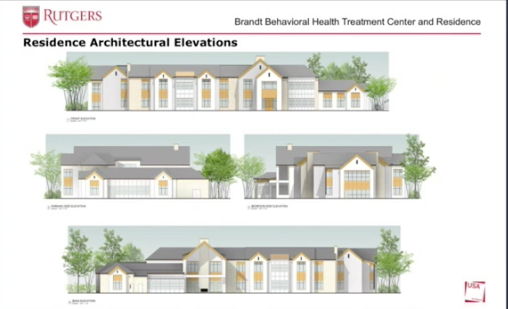About seven years ago, Marlene Brandt, a Rutgers University graduate and local philanthropist, watched her 17-year-old daughter suffer from severe depression, the inability to function in school, unhappiness, and a feeling of very little will to go on.
Brandt searched New Jersey without finding a treatment center to properly address her daughter’s needs. She realized she would have to travel to Massachusetts or Baltimore, Md., as the closest areas.
Settling for Boston, her daughter received “life-changing” treatment for about two months, but this situation led Brandt to develop the concept for a state-of-the-art treatment center much closer to home.
Thus, the Brandt Behavioral Health Treatment Center and Residence was born, which will accommodate a treatment facility, plus a two-story residential building with eight beds for young adults ages 16 and 17, and eight beds for young adults ages 18 to 24, who suffer from mood and anxiety disorders, but who are not at imminent risk of hurting themselves or others.
The North Brunswick Planning Board was granted a courtesy review of the plans by Rutgers University on March 9.
The portion of the plan that lies in North Brunswick is part of Rutgers’ Cook/Douglass campus off Ryders Lane in the educational and biological research zone, according to Frank Wong, a licensed professional planner representing Rutgers as assistant vice president of planning and development.
The Rutgers Equine Science Center sits on the 5-acre property. Two dilapidated buildings will come down. An area for hazelnut research is winding down, Wong said.
“The setting itself is a peaceful and therapeutic one and part of that for the residents is part of the healing process and part of the therapeutic environment,” said Dr. Frank A. Ghinassi, a licensed clinical psychologist and president and CEO of Rutgers Behavioral Healthcare.
Ghinassi said the usual length of treatment in the residences would be two to six weeks for those needing daily treatment or for those who are traveling a long distance to attend.
Each unit will have a single bed with its own bathroom.
The treatment center will offer in-patient or outpatient therapy, consisting of individual or group therapy, partial hospitalization, peer support and medication delivery as warranted.
The outpatient facility is expected to treat 70 to 75 patients per day from 9 a.m. to 8 p.m.
The residences are expected to accommodate 200 people per year.
The facility will be staffed 24 hours a day, seven days a week by about 40 staff members total.
“We are extraordinarily excited about this program. This offers a level of treatment complexity and treatment completeness across residences and outpatient that is unparalleled in New Jersey,” Ghinassi said.
Ghinassi said although the program is beginning with Brandt’s philanthropy, there will be a business model to accept insurance plans, serve the undocumented, and become self-sustaining; her gift allows for the building of the facility.
Ghinassi also explained that the facility mirrors the key examples of Rutgers’ mission: evidence-based treatment for patients and their families; advancing the sciences through research of anxiety and depression; and training the next generation of healthcare providers.
As such, Ghinassi said there will be a national search to recruit a research director.
As for the details of the plan, Wong said there will be a driveway at the intersection of Ryders Lane that will align with a driveway on the opposite side.
To enter, one would come down Ryders Lane from Route 1 and make a right.
To leave, there would be only a right turn onto Ryders Lane. The median currently in the center of Ryders will be filled in to prohibit a left turn, he said.
Or, one could leave the site toward the south to find Route 1 and ultimately the New Jersey Turnpike.
The intersection does not require a traffic signal currently, but the roads are aligned in the event a light is needed in the future, Wong said.
“The revised configuration makes for a much safer way of entering and exiting the site,” Wong said.
In terms of emergency services, the North Brunswick Volunteer Fire Department would provide fire response with Rutgers emergency services. Rutgers police would provide police services, Rutgers emergency services would provide ambulances, and Rutgers fire inspectors would inspect the property, Wong said.
As part of the courtesy review, Thomas Vigna, North Brunswick’s township planner, made a motion on the record to establish that the proposed use is not in conflict with North Brunswick’s Master Plan and that the land use designation is acceptable.
Contact Jennifer Amato at [email protected]

